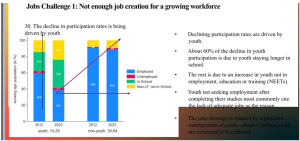
The World Bank’s latest Ghana Economic Update notes that although Ghana’s economy has expanded over the past decade, job creation has lagged sharply behind the pace of its growing workforce.
Between 2012 and 2023, the working-age population grew by 2.7 million yet net employment rose by only 250,000. The Bank warned that this labour market gap threatens the country’s development prospects and its ability to benefit from a demographic dividend.
Robert Taliercio, Division Director for Ghana, Sierra Leone and Liberia, observed that despite GDP growth, job creation in Ghana has not kept pace with the expanding labour force.
“The challenge is ensuring the growing workforce is absorbed into productive and well-paying employment,” he added. The report, Addressing Labour Market Challenges and Opportunities in Ghana’s Economic Landscape, found that most jobs created in the past decade were in low-productivity sectors while manufacturing and higher-value services saw limited gains.
This has kept many workers in low-quality roles with few chances for upward mobility, it added.
Better-educated workers are entering the labour market, but the growth of high-quality jobs has not matched the rising supply of skilled labour. Average earnings have declined and underemployment remains high in both rural and urban areas.
Mr. Taliercio noted that “weak labour demand in growth-driving industries means workers are often moving between equally low-paying jobs, with few chances to advance”.
There is a a growing mismatch between education and labour market needs, with women and youth facing persistent barriers to quality jobs. Many young people struggle to transition from school to work, while gender disparities in access to better opportunities remain wide.
Consequently, the World Bank calls for an integrated strategy that combines investment in human capital, business-enabling policies and private sector growth.
It recommends improving education quality, aligning training with market demands and promoting high-potential sectors such as manufacturing, agro-processing and digital services.
Agriculture remains an important source of employment and could see productivity gains through value chain development and climate-smart practices, the report said.
The post Editorial: Growing mismatch between education & labour market appeared first on The Business & Financial Times.
Read Full Story














Facebook
Twitter
Pinterest
Instagram
Google+
YouTube
LinkedIn
RSS